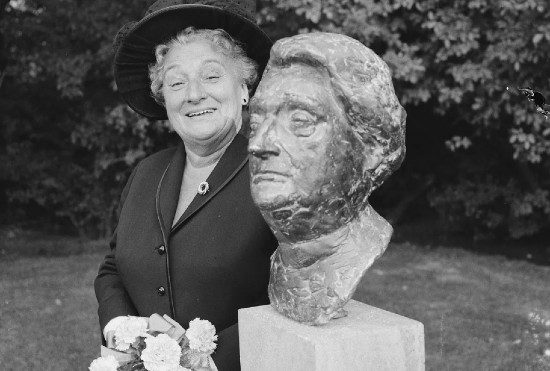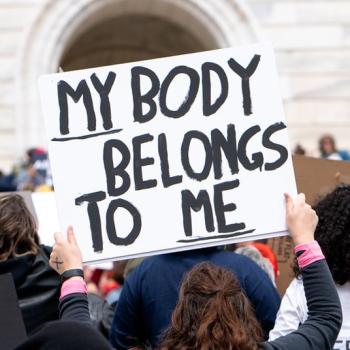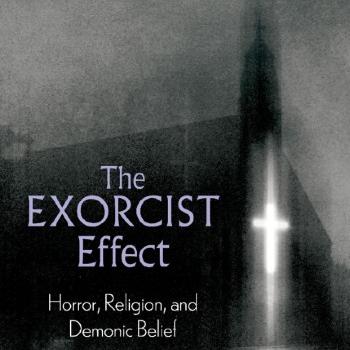• “Boy Problems: The manosphere promises to fix young men’s lives. Instead, it’s making them miserable.”
Eamon Walker’s long piece for Mother Jones is anchored in the real experience of one real young man. Somehow that makes it both more hopeful and more heartbreaking.
• “The Unsung Hero Who Saved Thousands of Children During the Holocaust”
In the aftermath of Kristallnacht, a violent, two-day pogrom in which Nazis and their sympathizers destroyed thousands of Jewish-owned businesses, homes and synagogues across Germany, the British government decided to allow Jewish children seeking refuge from the Nazis into the country. This program, known as the Kindertransport, brought nearly 10,000 children to the United Kingdom between December 1938 and May 1940. (With public opinion polls showing a lack of support, a similar campaign in the United States never even reached Congress.)
Truus Wijsmuller was a fearless, tireless woman. I love this photo of her from 1965, posing next to a statue in her honor and finding that hilarious. 
• “The Overlooked Origins of the War on Bud Light and Other ‘Woke’ Companies”
In the period after the Brown v. Board of Education decision of 1954, segregationist politicians attempted to use state power to punish progressive corporations, civil rights groups, and media outlets; pundits condemned what they saw as the narrowing of acceptable discourse and the demonization of their racist worldview; and citizen groups organized boycotts to maintain segregation.
White conservatives have always loved to boycott (or threaten to boycott) companies that allegedly support anything that white conservatives see as threatening their protected-but-not-bound status. That includes at least three launched-then-forgotten Disney boycotts in recent decades. Lawrence Glickman’s history focuses on an earlier period, offering up a host of mid-20th-century examples, including many that involved a 1950s right-wing freak-out over dangerous liberal threats to minstrel songs. Yeesh.
If I ran the ad account for Bud Light I’d make a Super Bowl ad that started with old news clips of that earlier generation of bigots and ended with the Dixie Chicks singing “Not Ready to Make Nice.”
The renting out of pews became very much a business opportunity for churches, generating a healthy income for them, but not everyone could afford their own family pew, so the pew opener would be expected to find suitable spaces for those unable to afford the luxury of their own pew box , these were often just benches which the opener placed down the central aisle of the church.
Pew boxes were usually owned by the upper class families for which they paid a rent, for example the accounts of Lord Mansfield noted that in 1785 he paid £1, 11 shillings to the ‘reader clerk and pew woman, Bloomsbury church’ and in 1790 he paid £3 8 shillings and 2 pence for the family pew and to the parish clerk, but it doesn’t give a more detailed breakdown of this figure. Similar sums were paid by him each year.
• Prestigious literary journals are not usually a forum for “personal testimonies,” or for essays exploring the author’s evangelical faith and their reasons for clinging to it. But once the Los Angeles Review of Books decided, rightly, that the songwriter David Bazan fully merits discussion in its pages, they also came to see that there was no other appropriate way to engage his work. So here is Matthew Mullins’ personal testimony and spiritual journaling: “The Air We Breathe Is Holy: Exvangelical Indie Rock.”
• “This state employee is scouring the Earth for solutions to combat invasive species in Hawai’i”
I will always be a sucker for swallowed-the-spider-to-catch-the-fly stories about the efforts to combat invasive species by importing their natural opposites.
• “10 Years Later, ‘Prisoners’ Eerily Predicted Our Current Moment”
Prisoners didn’t invent its stakes out of whole cloth—the idea of doing anything to protect your child was not a new one when it was made. But it did tap into the dark fantasy that drives both Qanon and the current moral panic that seeks to smear all LGBTQ people as “groomers”—the notion that all you need to do is identify someone as a threat to children to make any action against them morally acceptable. And as much sense as that may make to any parent, even a non-violent one, Prisoners asks: what if you’re wrong?
• Austyn Gaffney, “A celebrated startup promised Kentuckians green jobs. It gave them a ‘grueling hell on earth.’”
A long, thoroughly reported story of the rise and fall of AppHarvest, a much-hyped attempt to reinvent agriculture in coal country. In some ways, it was an interesting idea that overpromised and tried to do too much too soon. In other ways, it was just another “disruptive” application of big tech money without a clear idea of how it was really going to work.
• “The Hunt for Dr. and Cora Crippen” (via)
A tale of murder and Scotland Yard detectives from 1910. But with a heck of a twist at the end.
















